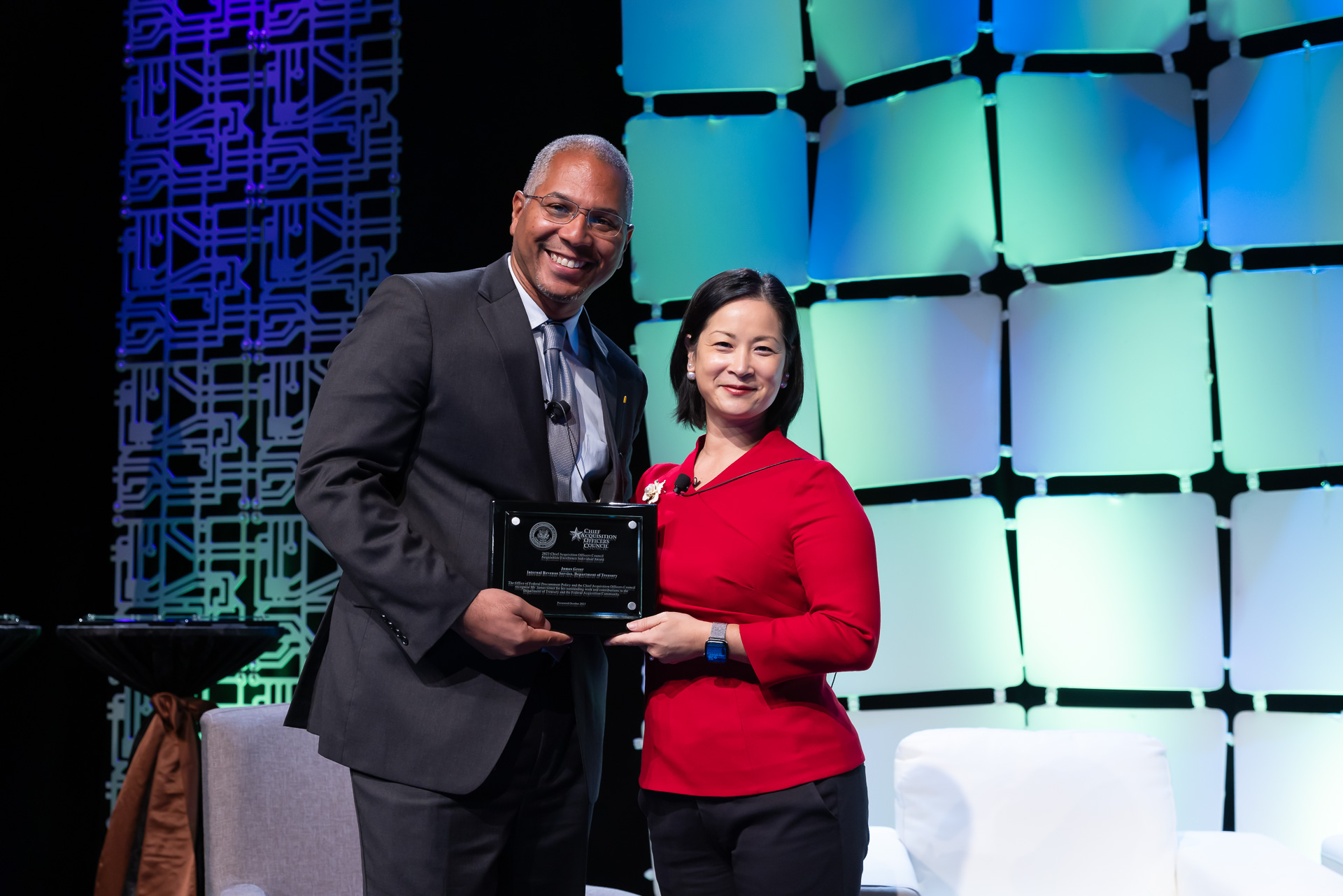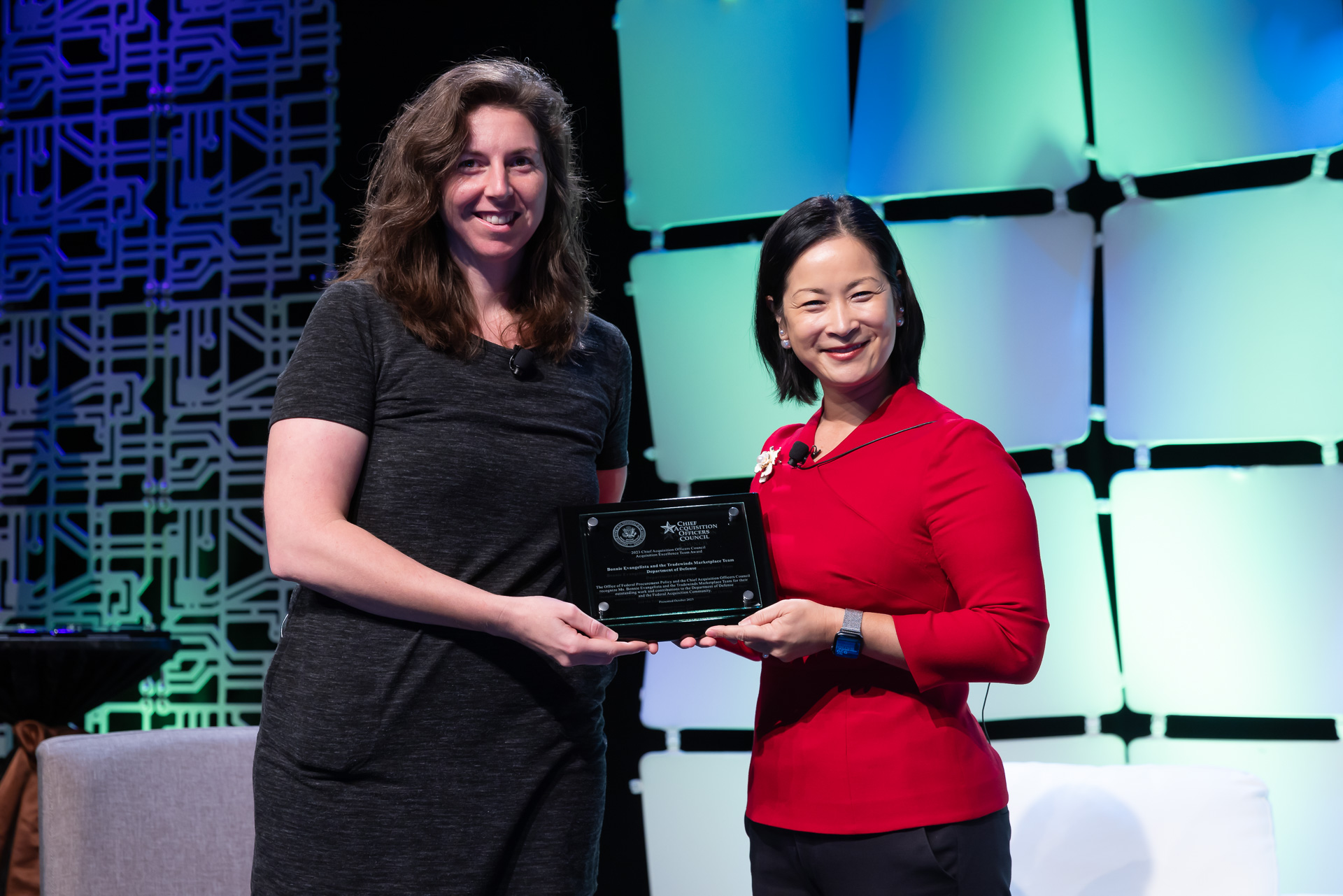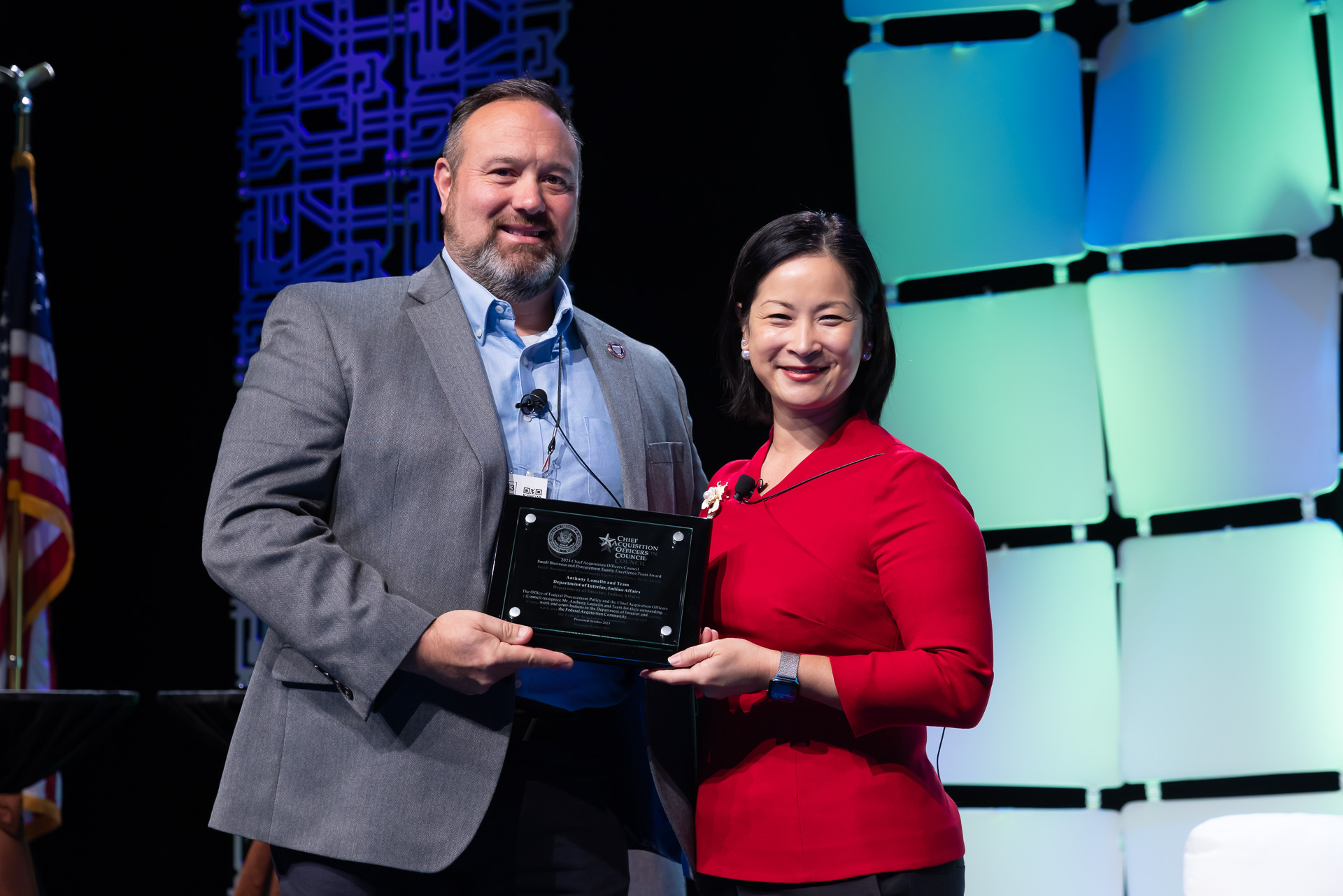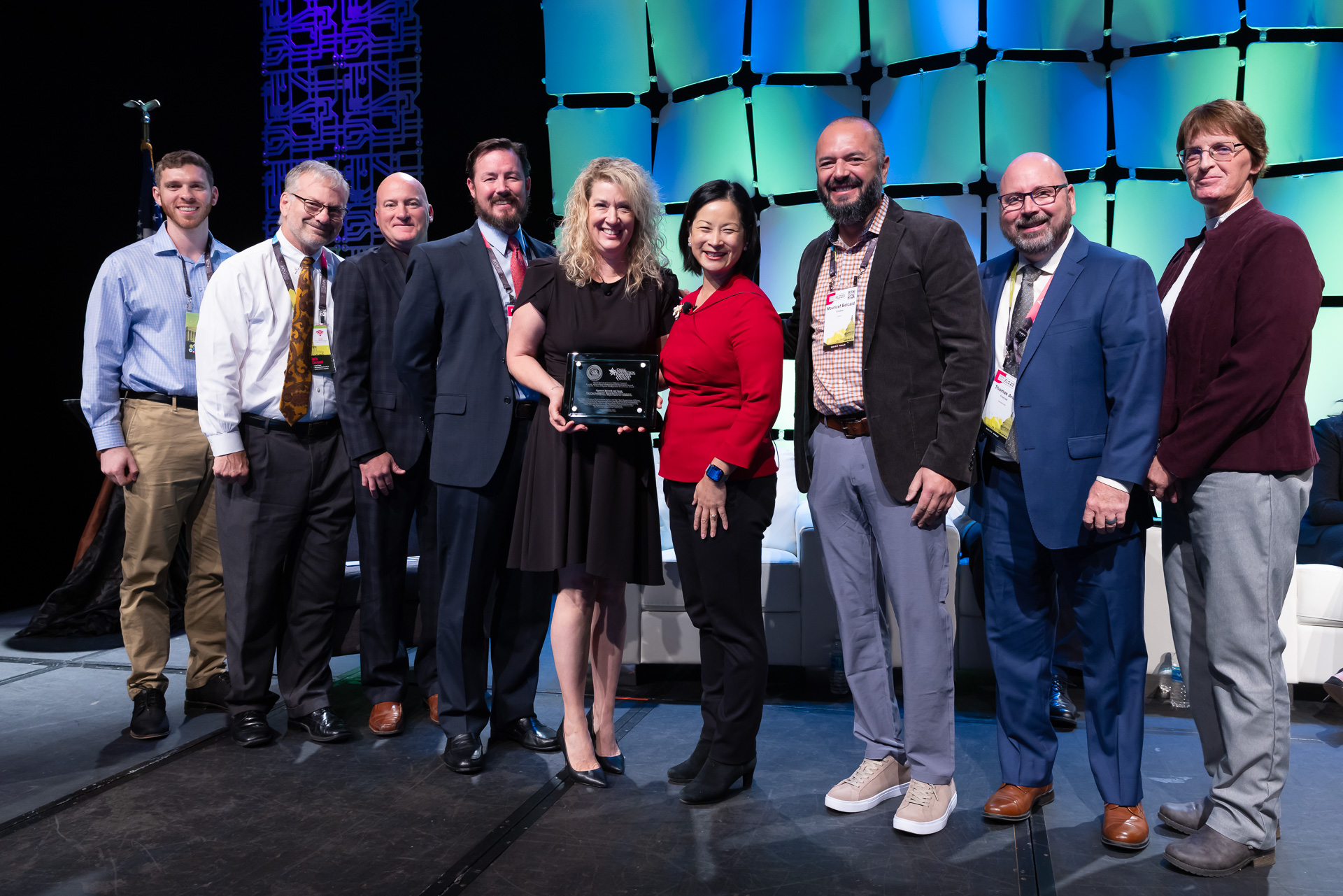2024 | 2023 | 2022 | 2021 | 2020 | 2019 | 2018 | 2017 | 2016
Acquisition is a catalyst to support critical public priorities such as domestic sourcing, supply chain risk management, and much more! Our acquisition workforce is the most important part of our acquisition system, so it’s especially important to support them. The Acquisition, Program Management, Small Business Excellence Awards recognize acquisition professionals who contribute to outstanding improvements in acquisition throughout the federal government. These awards, given on behalf of the Chief Acquisition Officers Council (CAOC), were presented earlier at the ACT-IAC ImagineNation Executive Leadership Conference. The award-winning efforts are impressive; you can read about the winners and the efforts below. Thank you to everyone who submitted nominations this year. Nominations for next year’s awards will be requested early next calendar year. Congratulations to all the award winners and their agencies!
James Greer, Acquisition Excellence Individual Award

James Greer is the co-developer and manager of the Acquisition Workflow Approval Routing Efficiency (AWARE) program. The AWARE program is an advanced automated workflow program designed to support the Office of the Chief Procurement Officer (OCPO) in its mission to modernize and streamline the acquisition lifecycle process. AWARE introduced process automation to minimize manual effort for users and leadership alike. Status and insights are now available in real time at the push of a button. AWARE’s capabilities include:
- Pre-population and document generation capabilities allow contracting officer representatives and program managers across the Internal Revenue Service (IRS) to enter information once. This feature eliminates redundant data entry tasks and ensures accuracy and consistency.
- Effectively tracking the details, methods, and timelines associated with the procurement of goods and services for the IRS, Bureau of Engraving and Printing, and Treasury Department. The information gathered in AWARE is utilized to create dashboards that offer a comprehensive overview, empowering management to make informed, data-driven decisions.
- Creating a shared workspace for business units to collaborate and receive feedback on draft acquisition documents, when completed, allows them to check the status of the packages.
- Capturing the procurement action lead time and the status and length of time it takes to complete each of the steps in the review and approval process facilitates ongoing monitoring and early identification of delays and/or barriers in the review and approval process.
- Using valuable insight, efficiently responding to data calls, addressing audit findings, reducing administrative burdens, and implementing policies that promote transparency and accountability throughout the acquisition lifecycle process.
By leveraging AWARE, James has significantly enhanced the efficiency and effectiveness of procurement operations.
AWARE has increased efficiencies in the review and approval process by reducing the overall time required to review and approve acquisition packages by approximately 20%. In addition, AWARE prepopulates data fields from other systems, removing the requirement for manual data entry. The development of AWARE dashboards allows for many data calls to be answered almost instantaneously, saving many hours of labor. These detailed insights ensure leadership is better equipped to identify bottlenecks and make decisions to increase efficiency across people, products, and processes at OCPO. By implementing this automation solution, James has significantly reduced the burden on contracting officer representatives, contracting officers/specialists, and OCPO leadership.
Bonnie Evangelista and the Tradewinds Solution Marketplace Team, Acquisition Excellence Team Award:

For the Department of Defense (DoD) to maintain a competitive advantage in a highly dynamic threat landscape, it needs to create and offer acquisition solutions that can deliver capabilities at speeds never realized before. As a result, the team focused on building an environment that:
- Creates significantly low barriers to entry,
- Enables fast-tracked assessments of solutions,
- Removes excessively burdensome submission requirements, and
- Provides optimal flexibility to develop contract strategies that support a wide range of acquisitions, including non-federal acquisition regulation-based procurements.
The Tradewind Solutions Marketplace (TSM) is the DoD’s ground-breaking solution to access high-tech innovation. TSM is a digital repository of post-competition, readily awardable pitch videos that address the government’s greatest challenges in the AI/machine learning, digital, and data analytics spaces. The solutions housed within the marketplace have been assessed and vetted through competitive procedures, and every video in the marketplace is readily awardable.
Upon submission of video solutions to the marketplace, a peer review panel of technology subject matter expert representatives from government, industry, and academia assesses each video solution to determine its technical merit against the established rubric criteria to enter the DoD solutions marketplace. Solutions that are assessed as possessing technical merit are placed in the TSM and readily available to be viewed, selected, and awarded by DoD activities. TSM is closing the gap between government buyers with mission problems and industry solution providers that have high-impact tech solutions.
The marketplace was developed and officially launched on Nov. 1, 2022, and has gained both attention and traction amongst the target communities of cutting-edge technology firms and government organizations. Since launch, the TSM team has assessed 297 video solutions and:
- 53% of all solutions assessed were assessed as awardable and placed in the marketplace.
- 95% of marketplace companies are non-traditional entities.
- 164 solutions currently reside in the marketplace.
- 10 contracts have been awarded within 30–60 days (even as fast as 10 days in one instance) to support pilot projects that aim to close mission gaps.
The top three types of solutions in the marketplace are:
- Improving situational awareness and decision-making.
- Discovering the Blue Sky Technology application.
- Streamlining business processes.
Darlene Bullock, Small Business Individual Award

Ms. Bullock realized there was a need for internal education (in-reach) to the Department of Homeland Security acquisition community and increased outreach to small businesses. In addition to conducting vendor outreach sessions, Ms. Bullock created vendor outreach matchmaking events (VOMEs), which are unique to DHS. VOMEs creates opportunities for small businesses, at no cost, in all regions of the country that would possibly never be able to interface with the other company participants to discuss potential partnering opportunities. Ms. Bullock communicated personally and directly with the large businesses, requesting their participation and explaining its importance. This resulted in over 50 large business participants for the first VOME.
Ms. Bullock’s leadership, in-reach, and outreach efforts resulted in the department’s 14th consecutive grade of “A” or higher on the Small Business Administration Procurement Scorecard. Fiscal year 2022 also marked the seventh grade of “A+” since fiscal year 2016. DHS, the fifth-largest spending agency with the third-largest federal workforce, is the largest agency to have this small business track record of success. DHS was the only top spending agency to exceed all small business prime goals in fiscal year 2022. Ms. Bullock’s strategic efforts resulted in the department exceeding its fiscal year 2022 small business prime goal of 34.50%, with 39.51% of obligations to small businesses.
Anthony Lomelin and Team, Small Business Team Award

The Department of the Interior (DOI) is committed to increasing opportunities for Indian Small Business Economic Enterprises (ISBEEs). The Buy Indian Act authorizes DOI to set aside requirements for Indian-owned businesses. While the Indian Affairs (IA) Acquisition Office is mandated to use the Buy Indian Act procurement procedures and set aside for ISBEEs, other DOI bureaus have the optional authority. The IA Office:
- Engaged each of the 11 DOI bureaus, sharing information on the Buy Indian Act authorities, providing bureau-specific ISBEE procurement data, and developing bureau-tailored strategies to increase the usage of the act’s set-aside authority.
- Facilitated the revision of both Health and Human Services (HHS) and DOI FAR supplements in fiscal year 2022 to increase and expand usage of the Buy Indian Act. For the first time, DOI set DOI-wide ISBEE prime contract and subcontract goals at 10% and 3%, respectively. Steps were also taken to ensure those goals are included in the performance plans of all covered DOI senior executives’ performance plans for fiscal year 2023.
- Designed and published a web-based Buy Indian Act Training that is available to the entire DOI contracting workforce and incorporated into departmental policy as mandatory for all DOI contracting officers.
- Developed nine new department-wide dashboards for conceptualizing previously unmanageable amounts of acquisition and financial data, enabling leadership to make data-driven decisions.
By partnering with other DOI bureaus and promoting Indian small business capabilities throughout DOI, the department increased awards to ISBEEs by more than $334 million (80%) from the previous year to include an increase of $47 million (25%) in direct Indian set-aside contract awards, all historical highs for the department. IA also exceeded government- and DOI-wide competition and small business goals for acquisitions in all categories, including a competition rate for all awards of 90% and awarding 82% of all dollars to small businesses and 73% to SDBs. The Office used category management strategies to award eighteen strategically sourced ISBEE set-aside IDIQ’s worth $1.37 billion in fiscal year 2021 and added seven more ISBEE set-aside IDIQ’s with maximum ceilings totaling $144.5 million in fiscal year 2022, covering common DOI and IHS-wide services and construction requirements. Additionally, over 2,000 DOI employees completed the Buy Indian Act training, which has garnered the attention of HHS, the Small Business Association, and the General Services Administration, which have requested that IA collaborate with them in developing their own versions.
Mouncef Belcaid, Peggy O’Connor, and Team, Program Management Excellence Award

In its nascent stages, the FirstNet Authority faced formidable challenges. Initially, there were evident gaps in the program and contract management frameworks. Yet, when the FirstNet Authority awarded the Nationwide Public Safety Broadband Network (NPSBN) Task Order 4 in 2018, centered on coverage and capacity services, it embarked on a monumental journey. Valued at multi-billion dollars, this task order aspires to offer comprehensive coverage services dedicated to public safety throughout the continental U.S. and its territories over a 24-year period of performance. As part of this unique public-private partnership, the contractor provides the government with the program's vast budget, which is then reinvested into the NPSBN.
The team's recipe for success was a harmonious blend of clear communication, innovative technology utilization, ongoing refinement, capacity enhancement, and a collaborative ethos.
Their efforts culminated in a system overhaul, notably truncating the period for processing contract deliverables, which tally between 75 and 100 artifacts monthly. What initially took nearly three weeks with manual processes has been innovatively condensed. Now, the FirstNet Authority's diligent team processes contract deliverables in just ten days post-reception. An amplified emphasis on quality assurance for contractor-provided materials has ushered in an era of enhanced transparency for contract overseers. This clarity extends into the evaluation of key performance metrics, serving not just the oversight team but also the executive echelons. Such unparalleled transparency paves the way for insightful decisions, encompassing not only the Task Order 4 undertakings but also the broader vision and future investments of the NPSBN.

